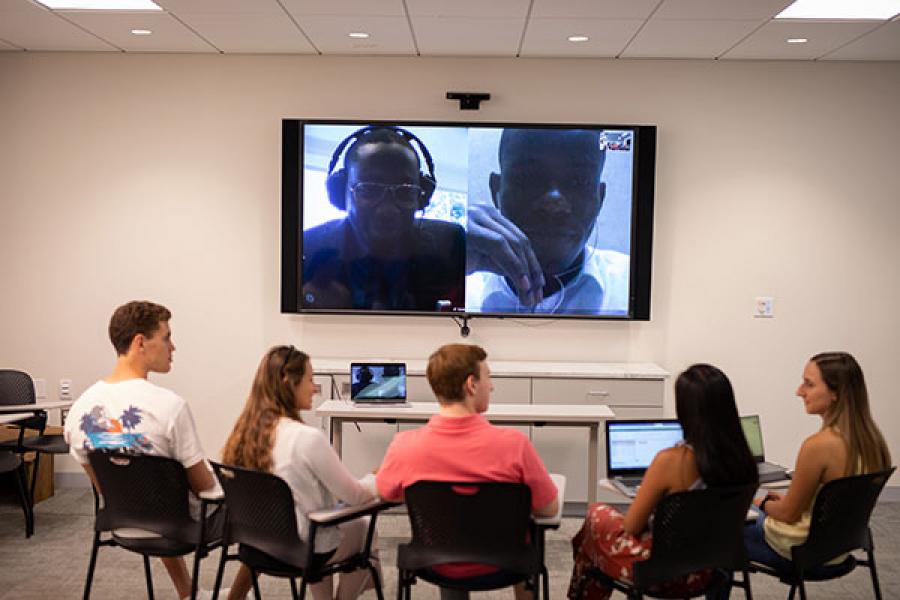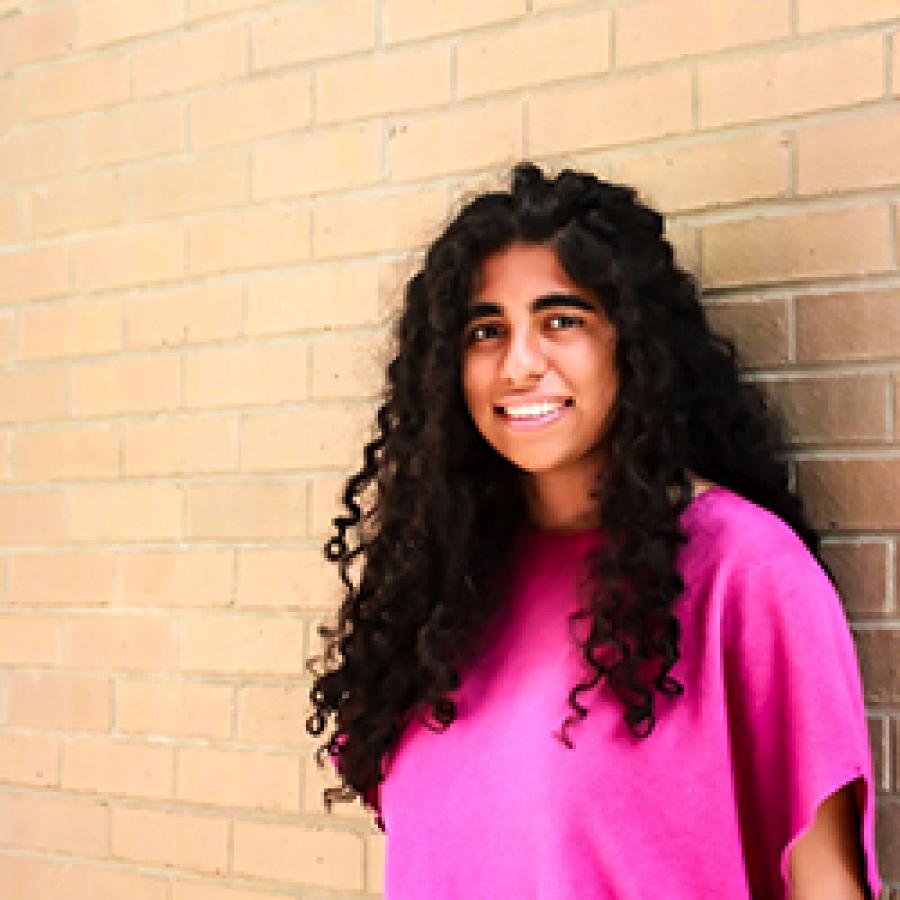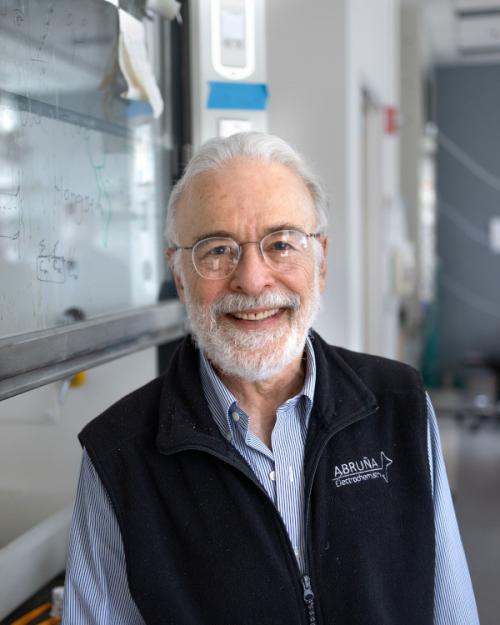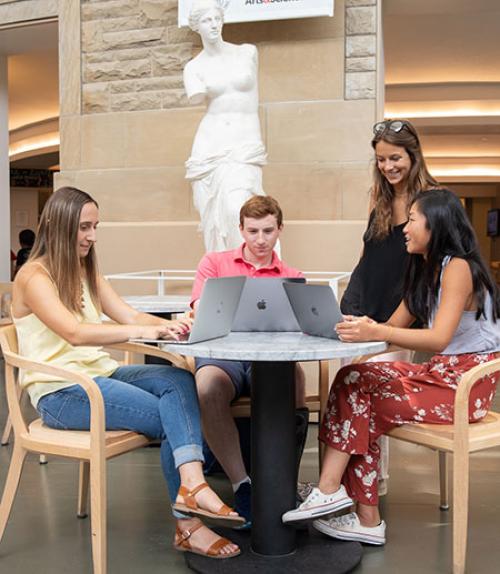Founding a company to boost entrepreneurs in Ghana is only the latest international venture for Clémence Bruguier ’21, a government and Russian major in the College of Arts & Sciences.
Her company, Humans to Humans, is one of nine student businesses whose leaders are staying in Ithaca this summer to work on their ideas through the Life Changing Labs’ Summer Incubator.
Bruguier’s team also includes Josh Londin ’21, a math and computer science major in the College of Arts & Sciences, Alec Costanza ’21, from the Dyson school in the College of Agriculture and Life Sciences and Elena Pertsalis ’21 and Francisco Wagner ‘21, both operations research in engineering majors.
Another key team member, Osei Boateng, a master’s student in the Sloan Program in Health Administration, is off campus this summer, but talks to Bruguier each night. And she also has Cornell alumni contacts in Ghana, who have provided key connections.
Bruguier’s business connects Cornell students to Ghanian entrepreneurs who need business assistance in areas such as finance, website development, marketing or human resources.
“This bridges the gap between developed and developing countries,” Bruguier said. “We’re just trying to level out the playing field because where you’re from should not impact your opportunity to succeed.”
Bruguier developed the business idea as a class project in International Humanitarianism, taught by John Weiss, recently retired associate professor of history, who introduced her to a former Ghanian student and has become a member of her advisory board.
“One of the things (in fact the thing) that has made it so difficult to retire is the amazing, inspiring productivity and imagination of Cornell students,” Weiss said of work by Bruguier and others. “I will be spending a good part of the time now freed up working on humanitarian and human rights projects with some of these same students who are now alumni and alumnae.”
Though only 20, Bruguier, who is from France, already has experience doing international work. She started a non-profit as a high school student that raised money through road races to boost education for girls in Cambodia, eventually founding a program that brings Cambodian girls to her French high school for a year of education.
The Humans to Humans team started testing their online platform in early July and hope to finalize it this school year so they could match students with companies next summer. This summer has allowed her to solidify the members of her team, which she found through the incubator.
“One of the reasons people shy away from start-ups is the risk, but what’s great about the LCL program is that you get all of the benefits of working at a startup – exposure to a business and the way it runs, the ability to develop skills and network with people —you wouldn’t get at a traditional internship,” Wagner said.
Humans to Humans team in Ithaca connecting by video to partner Osei Boateng in New York City and entrepreneur Richmond Badu in Accra, Ghana, with whom they are running their beta project.
An eight-week summer experience, the incubator program features mentors and speakers who help companies in areas such as KPIs (key performance indicators), legal, customer discovery and branding. Life Changing Labs is a non-profit that offers numerous resources for Cornell entrepreneurs, with support from the Student Agencies Foundation and Entrepreneurship at Cornell.
Three days a week, incubator students gather at eHub in Collegetown to pitch their businesses and offer feedback. But most days, students are working on their own at various locations across campus.
Cole Thienes ’19 and his partner, Jack Pertschuck ’19 have found space in Rhodes Hall to work on their company, Poloma Analytics, which offers a machine learning algorithm that speeds up the due diligence process for drug companies looking to acquire new drugs from smaller companies.
“We can read 70 million pages of information in about 10 minutes and read it like a human would,” said Thienes, who majored in economics and biology in the College of Arts & Sciences and spent last summer working in the analytics area of BlackRock, an investment management company. He thought their idea could solve a problem for pharmaceutical companies.
The process of acquiring a new drug from a smaller company or a university research lab often involves lawyers and analysts reading through reams of information kept in a “data room” in the cloud, including background about the company or lab, the drug’s development, clinical trials, FDA tests and results, academic papers, patent applications and so on.
Their platform can absorb the data and analyze it to find new information, note inconsistencies and compare to find similarities throughout, Thienes said.
“I love talking to people who tell you their story and then hold up a red flag for you, a problem they can’t solve,” he said about being an entrepreneur. “You can bury into that flag and find the root of the problem and then find out exactly how you can solve it.”
Vini Tripathii ’19 is also working to solve a problem through her business, Invictus BCI, which is developing more functional and comfortable hand prosthetics.Tripathii, an electrical and computer engineer, created the business after a close friend lost her hand to an amputation and wasn’t able to find a suitable artificial one.
“A state of the art prosthetic for hand costs between $80,000 and $100,000,” she said, yet their functionality is surprisingly limited and they’re uncomfortably heavy, causing many people to stop using their prosthetic all together.
Combing her knowledge of machine learning, engineering, neuroscience and biology, Trupathii is working on a non-invasive hand that uses sensors, brain signals and machine learning to mimic every action of a human hand.
Although her hand won’t have nerve endings, “I don’t think there’s anything that’s not possible,” she said of someone who uses her hand, from zipping zippers and shifting gears to creating fine needlepoint designs or playing the piano.
This fall, she will enter the master’s of engineering program at Cornell Tech and plans to continue working on the business, taking advantage of the entrepreneurial atmosphere of the Cornell Tech campus.
“I know I want to make this into a real business, to make this into a product that people can use,” she said.






